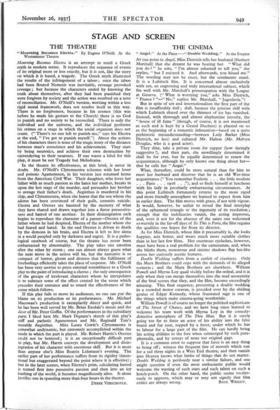THE CINEMA
" Angel." At the Plaza—" Double Wedding." At the Empire AT one point in Angel, Miss Dietrich tells her husband (Herbert Marshall) that she dreamt he was beating her. " What did you do ? " he asks, " I'm almost ashamed to tell you," she replies, " but I enjoyed it. And afterwards, you kissed me." The wording may not be exact, but the sentiments stand. It is a Lubitsch film. It is concerned almost exclusively with sex, an engrossing and truly international subject, which fits well with Mr. Marshall's preoccupation with the League at Geneva. (" What is worrying you," asks Miss Dietrich, " France ? "—" No," replies Mr. Marshall, " Jugoslavia.")
But in spite of sex and internationalism the first part of the film is insufferably dull ; dull, because the pristine skill with which Lubitsch skated over the thinnest of icc has vanished. Instead, with thorough and almost elephantine jocosity, the " house of ill fame " (though, of course, it is not mentioned as such and is kept by a Grand Duchess) is planted on us as the beginning of a romantic infatuation—based on a quite prehistoric misunderstanding—between Lady Barker (Miss Dietrich, no less) and cultured Mr. Halton (Mr. Melvyn Douglas, who is a good actor).
They dine, take a private room for supper (how daringly suggestive !), and then part, she unwillingly determined it shall be for ever, but he equally determined to renew the acquaintance, although he only knows one thing about her— that he calls her " Angel."
What, thereafter, could be more natural than for him to meet her husband and discover that he is an old War-time acquaintance (" You remember Paulette . . . the little modiste . . . Paris . . . 1916 . . ."), and so finds himself at luncheon with his lady in peculiarly embarrassing circumstances. At this point Lubitsch fortunately returns to the more rapid and more friendly atmosphere we learned to expect from him in earlier days. The film moves with grace, if not with vigour. It would, however, be unfair to reveal the final interplay of the ephemeral triangle or the ingenuity of its resolution ; enough that the indelicacies vanish, the acting improves, and, were it not for the absence of the satire one welcomed so warmly in the far-off days of So This is Paris, the film regains the qualities one hopes for from its director.
As for Miss Dietrich, whose film it presumably is, she looks happier, acts better, and wears much more suitable clothes than in her last few films. Her enormous eyelashes, however, must have been a real problem for the cameraman, and, when she blinks them, monstrous and sinister shadows flap bat-like across her curiously ascetic features.
Double Wedding suffers from a surfeit of craziness. Only the Marx Brothers could cope with the demands of its alleged scenario ; and the Marx Brothers are elsewhere. William Powell and Myrna Loy quail visibly, before the ordeal, and it is only when they can merge themselves into the mad anonymity of the final scenes that they, and the film, become exceedingly amusing. This final sequence, presenting a double wedding in a crowded motor caravan, is presided over by the abiding genius of Edgar Kennedy, whose frustrated rage is one of the things which make cinema-going worthwhile.
William Powell is of course no longer the polished sophisticate of The Street of Chance, and we have long since learned to welcome his team work with Myrna Loy in the comedy- detective atmosphere of The Thin Man. But it is surely going too far to force an actor of his ability into the false beard and fur coat, topped by a beret, under which he has to labour for a large part of the film. He can hardly bring his acting abilities to the fore when submerged by such para- phernalia, and by coveys of none too original gags.
It is a common error to suppose that farce is an easy thing to bring off ; witness the frequent fate of morsels which run for a sad three nights in a West End theatre, and then vanish into Heaven knows what limbo of things that do not matter. Double Wedding is perilously near a similar failure, and one might question if even the most enthusiastic public would welcome the wasting of such stars and such talent on such a hotch-potch. On the other hand, the public seems vocifer- ously to approve, which may or may not signify that film














































 Previous page
Previous page